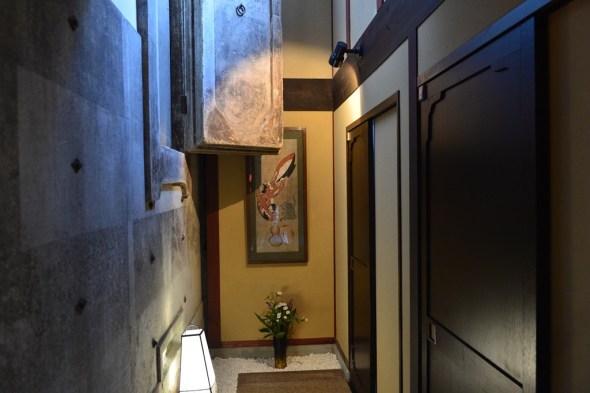General Information about Higashi Chaya Machi
Higashi Chaya Machi initially flourished as the suburb of the Kanazawa Castle.
Its residents were totally immersed in the art of “No’u,” a traditional Japanese folk singing and dancing performance, so much that “No’u” singing would fall from the skies when one walked the streets of Higashi Machi.
Eventually, during the Edo Period this rich musical tradition transformed into teahouse performances by women, who sing, dance and perform to entertain guests to this day.
A Glimpse Into the Teahouse World
Most teahouses do not allow new customers, or “Ichigen-San.”
To visit any of the teahouses open for public viewing, a visitor must pay a fee.
As one can guess from these kinds of policies, the teahouse world at Higashi Chaya Machi is wrapped in secrecy and privacy. One must be an insider to really understand what the teahouse life is for entertainers and customers.
But you’re in luck!
Higashi Chaya Machi is a popular tourist destination that also hosts myriad boutiques filled with arts and crafts (such as gold leaf crafts), and there are many cafes and other resting spots that a visitor, even an “Ichigen-San,” can visit and enjoy!
Just walk along the streets of Higashi Chaya Machi and you will understand that this is a special place that has had a long history of entertainers and workers since the Edo Period.
Every building to both sides of the street look like a silhouette from a Ukiyo’e style painting.
Many women and men must have had romantic experiences, as well as bitter ones– the small openings and windows of the teahouses were probably used by the entertainers to peep out and see if their loved ones had come by. That was the life of an in-house trainee, who often had nowhere else to live.
Beautiful architecture can also be seen in some of the other shops near the teahouses, too.
For example, this rice store, built more than 100 years ago, and in business even longer (established during the Edo Period), uses traditional architectural techniques that have been designated as important cultural heritage by the Japanese government.
Higashi Chaya Machi is also famous for gold and gold leaf art and crafts.
Throughout the city, all sorts of paintings, furnishings, and even iPhone cases (!!) decorated and embellished with gold leaf is for sale.
A gold leaf embellished iPhone case might be a great souvenir for someone who wants to remember the highly stylized, quaint feelings of this magical teahouse town.
Open to the Public
Despite the secrecy and privacy that surrounds and protects the teahouse district, as mentioned above, some of the teahouses and museums, as well as boutiques and gift shops, are open to the public.
The museums have preserved the interior of the teahouses, many of which have been designated as important cultural heritage.
Don’t be deceived by the old, worn-out looks of the exterior of the teahouses– once you step inside, a mixture of modern and tradition creates an experience unmatched by merely looking at the teahouses from walking the main street.
You will be blown away at how intricate and thought-out the view, furnishings, and interior design are, compared with the plain and simple looks of the teahouses from the outside.
Souvenirs and gifts
Souvenirs and gifts are on display from the shopwindow, but a tour inside a teahouse-turned-boutique might amaze and surprise you!
Gold leaf crafts might be a staple of Higashi Chaya Machi, but so are pottery and other traditional Japanese crafts made of wood and lacquer, popular throughout Kanazawa prefecture.
Don’t worry too much about finding things you could use at home, too– most of the traditional crafts are tailored for modern uses– like the iPhone case mentioned above!
A popular gift is a beer cup made in the traditional pottery style. A sip from this unique, beautiful cup is bound to provide a special experience back home when drinking cool, refreshing beer or other drinks, reminiscing about the visit to Kanazawa.
Who knows?
If you are visiting Kanazawa around fall, you may be able to enjoy both the beautiful arts AND mesmerizing foliage.
Look out the window into the middle courtyard inside a teahouse or boutique, and you might be able to see a sophisticated maple tree changing colors to bright red, getting ready for the cold Kanazawa winter.
Visit A Teahouse
“Shima” is a famous historical teahouse open for public viewing.
Visitors to Shima can also enjoy some traditional Japanese sweets and tea while enjoying teahouse history and architecture.
Sit down, sip some tea, and imagine what the bustling night life was like during the Edo Period.
A traveler might have rested and had some tea with some Japanese sweets to get ready for a long night of entertainment– filled with songs and musical performances by beautiful women– and refreshing sake.
Listen closely… Maybe you will begin to hear the teahouse songs falling from the skies as well.
Related Tours:
4-Day Takayama Holiday : Mt. Fuji, Hakone, Takayama, Shirakawa-go, & Kanazawa from Tokyo (Round Trip Plan)
3-Day Takayama Holiday : Takayama, Shirakawa-go & Kanazawa from Nagoya
9-Day Japan Combination Package from Tokyo (Round Trip): Tokyo, Kamakura, Mt. Fuji, Takayama, Shirakawa-go, Kanazawa & Kyoto
JTB is the best place to buy Japan Rail Pass, FREE shipping within USA!
Explore Japan’s top destinations with the help of JTB Sunrise Tours
Search JTB’s Special discounted Airfare to Japan and Asia

















